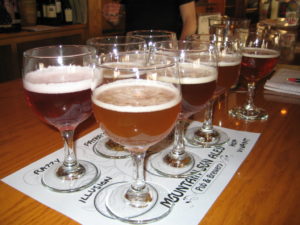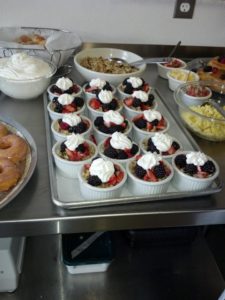By: Ryan Hodros, Pastry and Culinary Arts Student
I’ve written in the past about intimidation and how it can make otherwise simple things much more challenging. I’ve also written about the things you can do to survive your first day, most of which revolved around the intimidating nature of doing something brand new. So I guess you can say I have something of an obsession with overcoming things that intimidate me.
A subject that is less Hollywood-dramatic but equally daunting is being presented with something that is familiar and comfortable. Overcoming some daunting task that terrifies you (I’ve gotten pretty good with the fryer in the past weeks, for anyone who’s been following this blog) is the kind of thing that gives you a sense of satisfaction. It has that great “climactic battle” feel to it, leaving the rest of the day with the vibe of a pleasant denouement—you are the hero, you have conquered, and now you get to rest on your laurels. Roll credits.
Overcoming the familiar, however, is less storybook perfect. On the face of it, it seems like a silly statement. “Overcoming something familiar? What’s that, like getting out of bed in the morning when you’re all snoodled up and comfortable? Boo hoo for you buddy.”
But it’s easy when you’re doing something you’re familiar and comfortable with to coast. You all know what I mean—you’re in a class (for me it was always English) that you’re the superstar in, and you’re given an assignment. Rather than doing work that’s commensurate with your abilities, you do middling work and collect you’re A, yawning your way through the pages without really challenging yourself. You don’t grow, you don’t add anything to the subject, you just skate through, easy-as-you-please.
I’m writing about this because we’re getting into the baking and pastry section of the Culinary Arts Program at Auguste Escoffier and I know that it will be very easy for me to skate. As a Pastry Arts grad, I’m pretty good at baking bread, and I’m fairly skilled at cakes and pastries. It will be easy for me to slip into a rut, go through the motions, and breeze through this. With this blog on the books, I’m challenging myself to do better work than before and stretch myself artistically.
I experience this regularly with my writing. Being a beer critic, there are no plots to manage, no characters to create, no worlds to build. It’s a very professional, very straightforward writing style, and it’s easy for me to slip into “formula writing,” and give more or less the same article every week, month-in and month-out.
But as an artist, it’s important to remember that you are in charge of your own education, not just in school, but every day, in everything you do. And if you’re thinking about attending Auguste Escoffier, chances are you have that artistic bent. You’re familiar with the rush that comes from having created something from nothing—from assembling art from parts.
Chefs are familiar with the idea of work becoming a grind. Sometimes you have to make the same ten dishes over and over and over until you can’t take it anymore. Sometimes you have to decorate a couple hundred cakes in a week, to the point where you wonder what the heck you were thinking getting into the profession in the first place.
But any job can be a grind. It’s important to keep the passion and the drive alive in yourself, and the easiest way to do this is to take the familiar head on. Rather than coasting through assignments that you know you’re good at, try to face them with fresh eyes. In many ways, this can be the most difficult part of an artistic job, but it will make what you do all the more rewarding.
If you decide to become a student at Escoffier, there will be lessons regarding things you already know how to do. Maybe your pies are already the star of the bake sale. Maybe your cream cheese frosting has won awards. Maybe your chicken is better than any chicken made by anyone ever. But try to keep your mind open in the face of this thing you’re already an “expert” in.
You’d be surprised how much you can learn when you think you already know everything. And no, there won’t be any trumpets blaring or Top Gun high fives. Nobody will pat you on the back and say “Hey! You’re better at something you were already good at! Way to go champ!” But there will be a sense of satisfaction that, while less dramatic, is in many ways deeper and more moving for the artist than any monster slain or bully confronted.
I had a writing professor when I was in school at Baldwin-Wallace who used to joke that “they give you your high school diploma when you know everything, your undergrad when you know half of everything, your Masters when you know a quarter of everything, and your PhD when you finally admit you don’t know anything.”
I think that applies to the culinary profession more than most art forms. There are only so many ways you can write a story, or paint a picture, or form a sculpture. But when given a blank plate, the possibilities available to the chef are virtually endless. Try not to let a sense of “I know what I’m doing” keep you from exploring new possibilities. You’ll have a lot more fun that way.



